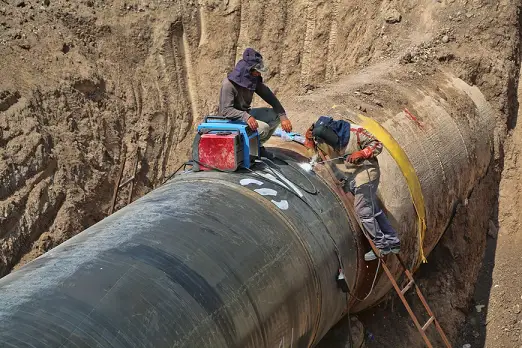As the war in Ukraine rages on and the West seeks to economically isolate Russia, Russia is using energy to forge closer economic ties than ever to non-Western powers, threatening to upend the modern geopolitical hegemony of the West.
A joint-venture pipeline between Russia and China which will deliver oil from Siberia to Shanghai is in the final stages of development. Already the “Power of Siberia” as the Russians call the Russian portion, began delivering gas to northern China in 2019.
Once in China, the pipeline follows the eastern side of the national boundary, down past Beijing, and on to Shanghai. The middle phase began operating in December of 2020, and the final section in the south will begin gas deliveries in 2025.
Russia’s state-owned Gazprom, and China’s state-owned China National Petroleum Corp. have been working together on the pipeline for roughly eight years.
The China-Russia pipeline is gearing up for operations just as Russia begins to face the prospect of losing sales to the European Union over the geopolitical situation regarding Ukraine. The EU is aiming to cut two-thirds of its Russian gas imports following the military operations in Ukraine.
Russia has reportedly invested $55 billion into the pipeline. Natural gas sales through the pipeline to northern China however have only totaled roughly $3.81 billion since December of 2019. The pace of Chinese purchases has accelerated this year however, nearly tripling in the first half of the year to $1.66 billion. While the numbers are on the low side, the pipeline is also far from completed.
Still, natural gas is only a tiny part of China’s energy imports, which are mostly made up of crude oil.
By volume, shipments via the pipeline were up by 63.4% to 7.5 billion cubic meters for the first half of the year. The plans for the pipeline ultimately envision 38 billion cubic meters in yearly deliveries.
In February, China and Russia inked a deal to expand China’s annual purchases of gas from Russia by 10 billion cubic meters. The deal was cited as a “long-term-commitment,” however it did not specify a time frame. Reuters estimated it would account for additional sales valued at $37.5 billion over 25 years.
In addition, China and Russia are discussing adding additional pipelines. One in particular, christened the “Power of Siberia 2” is to begin construction in two years.
China and Russia have also begun working together on nuclear power development. Russian President Vladimir Putin and Chinese President Xi Jinping, in May of 2021, spoke virtually at the groundbreaking for two jointly constructed nuclear power plants in China..
And on top of all of that, China has recently been increasing imports of Russian coal, which, as with many other Russian energy products, is being sold at a discount due to Russia’s geopolitical situation due to the war in Ukraine.
The longer the war in Ukraine carries on, the the closer the economic ties are, which are being forged between Russia and the non-Western powers.

